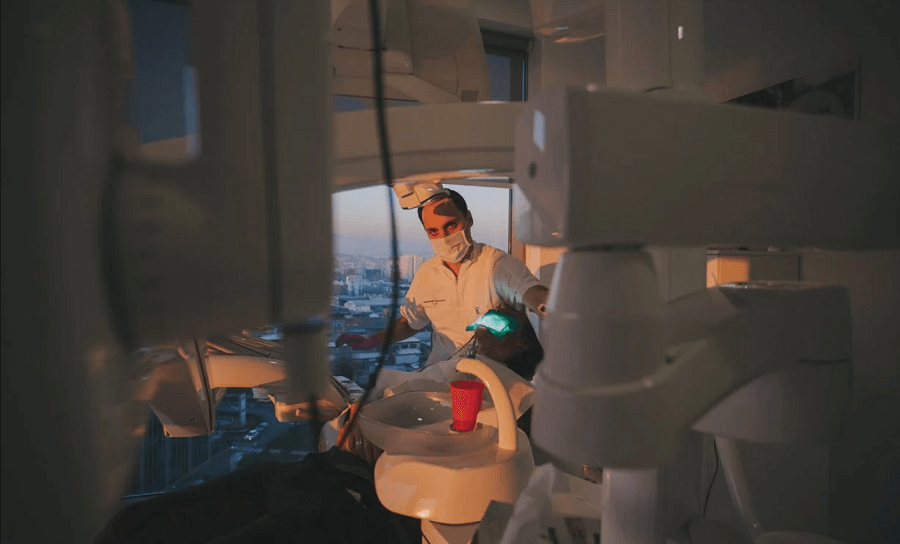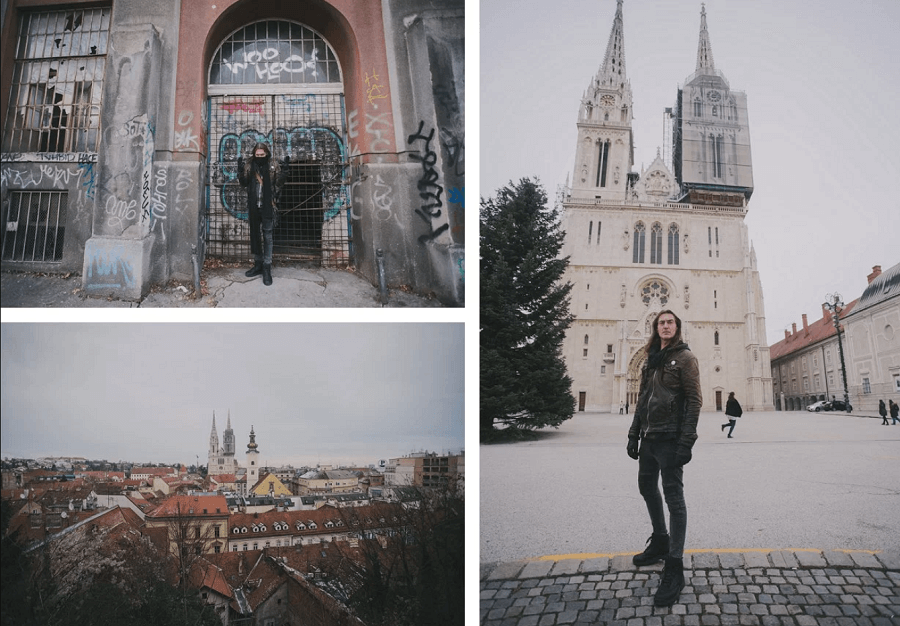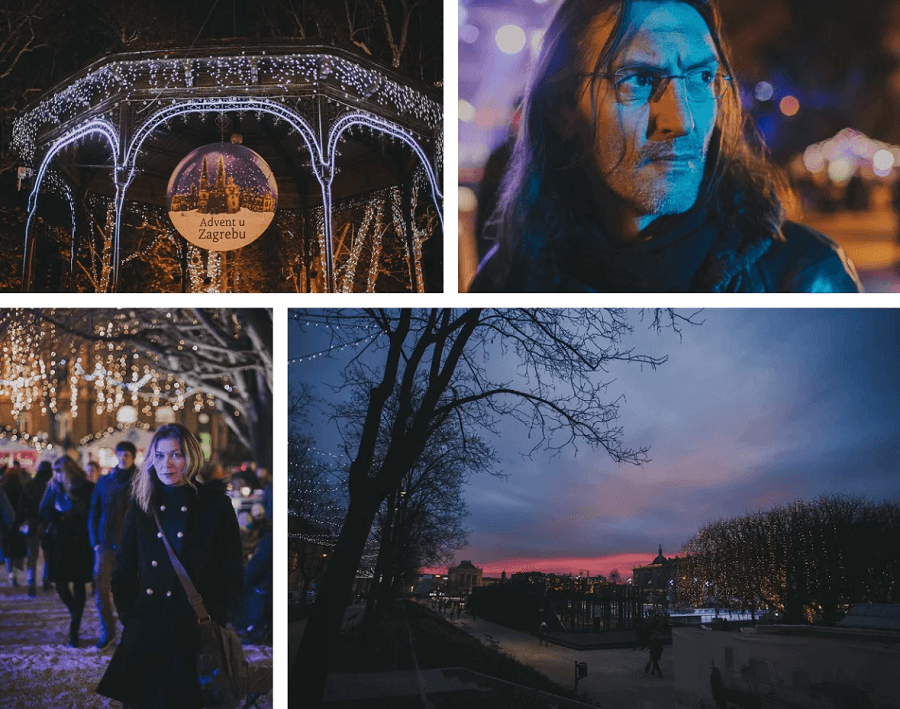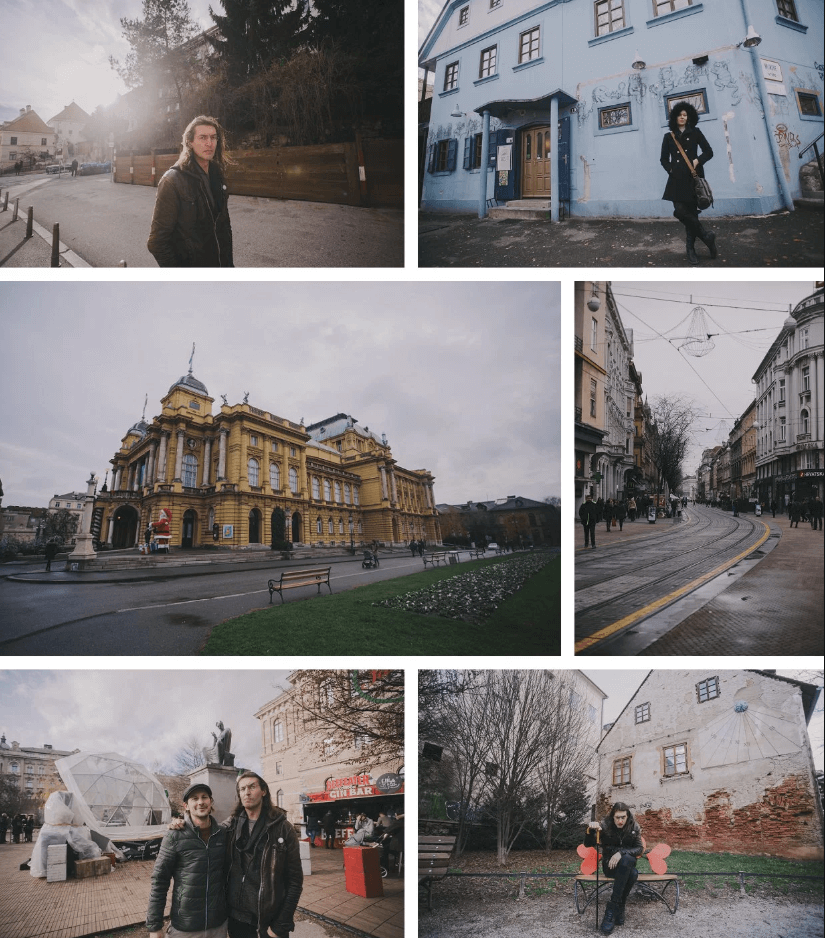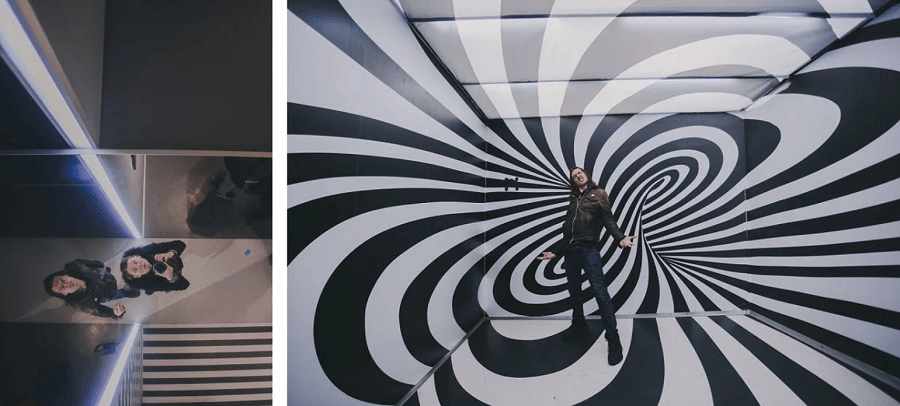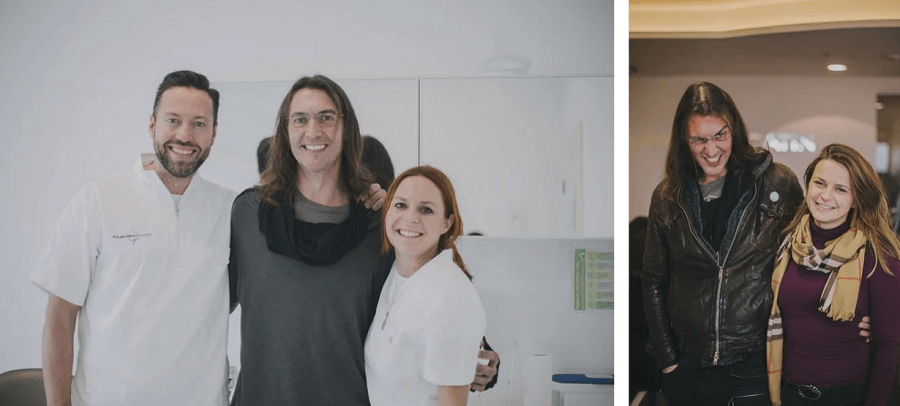Plenković Again Invites Pope Francis to Visit Croatia
ZAGREB, February 6, 2020 - Prime Minister Andrej Plenković on Thursday invited Pope Francis to visit Croatia, expressing hope the visit would happen at the right time even though the pope usually visits smaller European countries without a Catholic majority, and as for the canonization of Cardinal Alojzije Stepinac, the pope's key message was "patience".
"I'm glad that we were received by Pope Francis today... I hope that he will visit Croatia at the right time," Plenković told reporters after meeting with the pontiff and the Holy See's Secretary of State, Cardinal Pietro Parolin.
After the audience, which lasted about 20 minutes, the Croatian PM and the pope exchanged gifts, with Plenković giving the pope the crucifix "The Crucifixion of Jesus" by Damir Mataušić and the second volume of the Beram Breviary in the Glagolitic script. He received from the pope a medal with key messages of solidarity and cooperation and several books authored by him.
Asked by reporters if today they had again discussed the canonization of Cardinal Alojzije Stepinac, Plenković said that during their brief meeting they mentioned that topic as well.
"The position of the government and, I can say, the entire Croatian people, is that our expectations and wishes are well-known, there is nothing new about that. We expect the entire procedure to be completed within the Catholic Church, as it should. The message we received is 'patience'," said Plenković.
One of the topics of the meeting between the Croatian PM and Pope Francis was ecumenical and interreligious dialogue, notably in the context of two important events held as part of Croatia's EU presidency - a meeting with representatives of the Council of Bishops' Conferences of the EU and the Conference of European Churches, and the international conference "Human Fraternity - the Foundation of Security and Peace in the World", organised by the Muslim World League, the leadership of the Islamic Community in Croatia and the Croatian Bishops' Conference.
"I think that the message we have sent through our presidency is that we are not only using the very good model of relations between the Croatian authorities and the Islamic community in Croatia but that that model can serve as an example to other European countries," said Plenković.
Pope Francis also gave Plenković a copy of a document he signed a year ago with Sheikh Muhammad bin Abdul Karim Al-Issa, the Secretary General of the Muslim World League who visited Zagreb earlier this week, with important messages on interreligious dialogue sent out in February 2019.
PM Plenković and Pope Francis also discussed topics related to Croatia's EU presidency and the pope's global role, given that Plenković today visited the Vatican, for the second time during his term, also in his capacity as the prime minister of the country chairing the EU.
Among those topics were the topic of migrations, ways of preventing illegal migrations and regulating legal ones, the fight against poverty and social exclusion, demographic challenges in Europe and joint efforts in fighting climate change.
Asked if they had discussed EU enlargement considering that the pope had visited Albania and North Macedonia, Plenković said that that topic had been mentioned as well, notably during the meeting with Cardinal Parolin, and that he had told them that the EU-Western Balkan summit, to be held in Zagreb in May, would send a strong message to neighbouring countries regarding the prospect of their EU membership.
This has been met with approval because we share the view that reform processes and the process of fulfilling the necessary standards can be encouraged only with a proactive policy and involvement, said Plenković.
He said that he expected the issue of opening accession talks with North Macedonia and Albania to be resolved ahead of the summit, notably after yesterday's report and proposal by the European Commission for a reform of the methodology of accession talks.
As regards Bosnia and Herzegovina, which was also discussed during the meeting, Croatia attaches great importance to relations with that country, notably with regard to the status of Croats as an equal, constituent ethnic group, he said.
"We have the Holy See's understanding regarding that topic," he said.
More news about relations between Croatia and Vatican can be found in the Politics section.
Croatia EU Ambassador: 'Good Riddance' UK Becomes English School Billboard
“Good Riddance, UK!” After Irena Andrassy, Croatian ambassador to the EU, delivered her side-splitting parting statement to the UK; one English language school in Zagreb, Croatia used the ambassador’s English language fail to their advantage. She emitted the Freudian slip (?) while chairing the last meeting between the envoy of the United Kingdom and the European Union.
‘Good Riddance’ Becomes Croatia Ad Campaign
To widespread amusement, Andrassy told British Ambassador to the European Union Tim Barrow "Thank you, goodbye, and good riddance" which means "Thank you, goodbye, good to be rid of you", according to JutarnjiList on February 6, 2020.
The Američki institut (American Institute), a private English language school based in Zagreb, posted a photo of the new jumbo roadside billboard promoting the ambassador’s gaffe. The poster says: “Good riddance", and attributes those apparent no love lost parting words to the Croatian ambassador. The American Institute logo and message follow below along with the slogan: “Rid yourself of bad English”.
"Tree tousand young people" | Irena Andrassy
Croatia Ambassador Scrambles for Control of Runaway Gaffe
The Brexiting British and English speakers around the globe have enjoyed many laughs at Ambassador Andrassy's expense. After realizing the joke was on her, she rapidly responded in a Twitter post implying that her apparent gaffe was intentional, but that she was only kidding.
This isn’t the first time the American Institute has used the poor English skills of celebrities for its advertising campaigns. In 2017, the language school advertised English lessons with a photo of Melanie Trump on a roadside billboard: “Just imagine how far you can go with a little bit of English.”
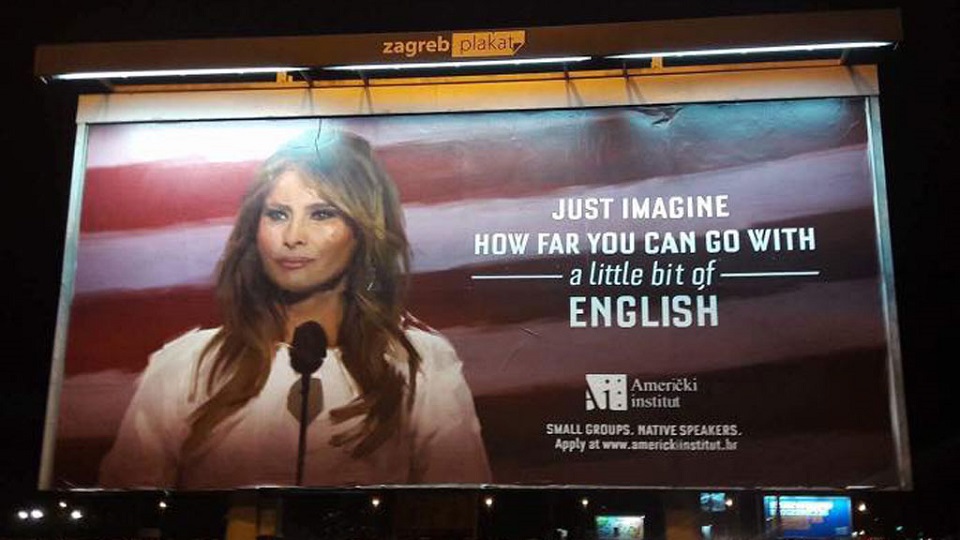
First Lady Dispatched Legal Team to Threaten Language School
The First Lady of the United States was displeased with this representation of her considerable accomplishments and command of the English language. Through her legal team, the she demanded that the school remove the billboards within 24 hours or face severe legal consequences. The American Institute bowed to the demands of Trump's powerful legal team. However, because they had already leased the advertising space, they replaced the poster with another clever billboard; this time without Melania’s image.
On their Facebook page, the American Institute posted a photo of a new billboard with the caption “Take 2": “Invest in your English and billboards. People love a good billboard,” the new billboard sign advised.
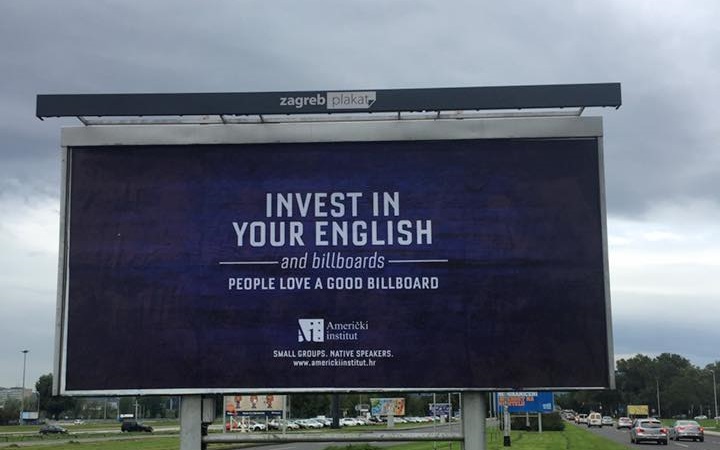
Click here for more Total Croatia News articles on the First Lady, her accomplishments and English-speaking skills. Follow this link for TCN articles on prominent Croatians speaking English. Check out the Američki institut’s Facebook page for more amusing promotional imagery and an illustrated array of vocabulary builders.

Parliamentary Committee to Inspect Police Treatment of Migrants
ZAGREB, February 6, 2020 - The parliamentary Committee on Home Affairs and National Security on Thursday adopted a report on the work of the Council for the Civilian Oversight of Security and Intelligence Agencies in 2019 and the Council's 2020 work programme, and decided to conduct direct oversight of the treatment of migrants by border police.
The Committee unanimously decided to conduct direct oversight of police work following complaints about the police treatment of migrants, Committee Chairman Ranko Ostojić (SDP) told the press after the Committee meeting.
He said that oversight would most likely include Committee members inspecting police work on the ground, after which the Committee would adopt conclusions.
As for the annual report on the work of the Council for the Civilian Oversight of Security and Intelligence Agencies, Ostojić expressed his satisfaction and said that none of the cases dealt with by the Council indicated any irregularities that would have required a special session of the Committee.
He said that the Council was not denied any information from the security and intelligence agencies and that their cooperation was good.
More news about the migrant crisis can be found in the Politics section.
Croatians Inclined to Alternatives to Petrol Vehicles, But Not Car Sharing
ZAGREB, February 6, 2020 - Nearly 65% of Croatians are inclined to alternatives to vehicles powered by petroleum fuels, but are not too keen on the idea of car sharing, a survey by tyre manufacturer Goodyear shows.
Goodyear has conducted an online poll in Slovenia and Croatia using the Facebook application Messenger to find out what people think about mobility in the future. The survey covered 1,794 Croatians and 962 Slovenians; it was held between 24 October and 24 November 2019 in Croatia and between 15 November and 16 December in Slovenia.
The survey found that Croatians are inclined to alternatives to classic vehicles powered by petroleum fuels as 34% of respondents said they would opt for electric vehicles, 31% would choose hybrids and 35% preferred petrol cars.
On the other hand, those interviewed were far less thrilled about the idea of car sharing. If they could choose between their own car, a high-speed train and car sharing, only 13% said they would opt for the latter, while a vast majority (76%) would choose their own vehicle.
The survey also found that nearly 80% of respondents in Croatia believe that passenger vehicles will be able to fly in the future.
The survey did not show any significant differences in responses between Croatians and Slovenians. The greatest difference was noticed in the view on electric vehicles as 50% of Slovenians would choose them, 32% would opt for hybrid vehicles and only 17.5% preferred petrol vehicles.
More car industry news can be found in the Business section.
HTZ: February Seeing Fewer Tourist Arrivals from China
ZAGREB, February 6, 2020 - Croatia is seeing a noticeable decline in tourist arrivals from China in the first week of February as a result of comprehensive and strict measures by Chinese authorities to contain the coronavirus outbreak, and travel demand is expected to stabilise in the coming period, the Croatian Tourist Board (HTZ) told Hina.
Some 4,400 Chinese tourists have visited Croatia since the start of the year and generated 7,600 overnight stays, which are respective increases of 49% and 19% compared with the same period in 2019, HTZ director Kristjan Staničić said.
"This growth is as planned and is the result of activities aimed at encouraging further arrivals from China. We have recorded a decline in tourist turnover from that market in February as a result of strict measures taken by the Chinese government and certain travel restrictions for the whole of February. Yet, Chinese tourists who were already in Europe during the emergency have continued their journeys," Staničić said, adding that the HTZ was in close contact with its office in Shanghai.
He expressed hope that the Chinese authorities would succeed in stabilising the situation as soon as possible so that demand from the Far East would recover. He said he did not expect any major consequences because Chinese tourists most often visited Croatia from mid-March onwards.
More news about relationship between Croatia and China can be found in the Politics section.
New Tourist Facilities at Slavonia's Amazing Papuk Nature Park
The renovation and equipping of the "Pannonian Sea House" is part of the praiseworthy "UNESCO Geopark Geostories" project at the incredible Papuk nature park, which was once in the middle of a sea.
As Poslovni Dnevnik/Marta Duic writes on the 6th of February, 2020, sixteen million years ago, Papuk was an island in the Pannonian sea inhabited by rhinos and being swum around by a now extinct species of shark. This is extremely difficult to imagine today, given that the modern day Papuk nature park is located in Slavonia, far from any sea.
Numerous fossils of now extinct living organisms, mostly marine animals, testify to the ancient past of this "Slavonian archipelago", located in Velika, within Papuk nature park. The popular continental Croatian nature park has now received a new, impressive exhibition - the Pannonian Sea House.
This visitor-education centre was opened back in late 2019, is part of the already existing Visitor Centre in Velika, and covers an area of 158 square metres. Along with impressive exhibition halls, there are multi-purpose lecture rooms for interactive lectures, a gift shop and even an outdoor classroom.
The renovation and equipping of the "Pannonian Sea House", worth almost five million kuna, is an important part of the "UNESCO Geopark Geostories" project, which is co-financed by the Ministry of Regional Development and EU Funds. In addition to the Pannonian Sea House, the project also purchased electric and mountain bikes for rent in Velika and in the Jankovac Forest Park.
The adrenaline park was built in Velika last year, and the first eco-park, Duboka, was opened three years ago, powered by solar panels and which has its own recycling yard and biological water purifier. This has made Pozega-Slavonia County, which is otherwise almost entirely overlooked by tourists, a top Croatian destination for anyone considering the environment, as well as for lovers of walking, hiking and recreation.
Otherwise, Papuk nature park had a record number of visitors in 2019, with 52,485 tourists visiting it - almost 50 percent more than a year earlier. There is no doubt that the Pannonian Sea House, as a testament to life as it used to be in the area, will attract new visitors, especially schoolchildren, who will learn about the geological story of this region in both an original and in a technologically advanced way.
In addition to the new tourist attraction, at the end of the year, the directors of five tourist boards gathered in Croatia to jointly promote the beauty and the tourist offer of this often forgotten region, namely Slavonia, and work together to promote and present Slavonia as Croatia's new tourist destination.
The Slavonia destination project will have an impact on the development of small and medium-sized enterprises (SMEs), as it implies a greater use of new technologies and communication platforms in the promotion and marketing of tourism products, and therefore the greater involvement of local businesses.
Make sure to follow our travel page for more information on Papuk nature park and much more.
Croatian Post Suspends Delivery of Small Packages from China
Croatian Post (Hrvatska posta) has stopped shipping small packages from China to Croatia, everything ordered through AliExpress will not be shipped.
As Poslovni Dnevnik/Bernard Ivezic writes on the 6th of February, 2020, fortunately, the coronavirus epidemic has not yet hit the health of the population in Croatia, but its onset has already hit the domestic economy.
Fuel might well be getting cheaper, but online purchases from China, primarily via AliExpress, has now been discontinued, and Croatian retailers predict that the economic impact of coronavirus, primarily on technological products, may soon be coming in the form of higher prices. Oil prices have fallen below 50 US dollars per barrel (49.92 US dollars), the lowest level in the past year, due to falling demand in China. The world's largest economy is also the world's largest oil importer.
But to curb the epidemic, the Chinese Government is shutting down factories, slowing down domestic and foreign trade, and introducing quarantines, and as such, the demand for oil on that market is falling. Consequently, prices of gasoline and diesel are also falling in Croatia as well. Other economic effects of the coronavirus epidemic will have a bad effect on business in Croatia. For starters, the coronavirus epidemic has temporarily shut down AliExpress's domestic business. Croatian Post first announced that it had received information from KLM, Lufthansa LH and Turkish Airlines that, to prevent the spread of coronavirus, they had suspended flights to China until further notice, and that this would affect the delivery of packages from there.
At the request of Poslovni Dnevnik, Croatian Post confirmed that the delivery of small packages from China to Croatia has now ceased. Therefore, no small packages you order through AliExpress from China will be able to ship to you at this time.
"The postal items from China to Croatia come exclusively by air, and although the carriers have primarily suspended flights because of the passengers, the shipments cannot reach Croatia," Croatian Post explains.
In numbers, this means that from Saturday to Tuesday, more than 100,000 packages, which should have been delivered to customers in Croatia, remained stuck in warehouses in China. By the end of this week, that figure will climb to about 250,000 packages and will not be able to be reduced until they can fly or the Chinese merchants divert air shipping to container shipping.
"About one million shipments come from China on a monthly basis, and the total number of packages has been growing steadily in recent years, by up to 20 percent annually," they say from Croatian Post. They state that this is a direct consequence of the growth of online commerce. However, just delaying deliveries from AliExpress could have a positive effect in the short term, that is, boost the sales of local online retailers. Not in the long run, however, because China is the world's largest factory.
Sime Essert, CEO of Nabava.net, an online service that compares the prices of more than 200 stores in Croatia, says that a real slowdown in direct imports from China will boost domestic online stores in the short term.
"Anyone who works with suppliers who will not be quarantined could profit in this situation or, for example, those who have a supply of limited goods. It's worth remembering the explosion of graphics card prices when the Bitcoin mining mania started," said Essert.
He added that at the moment, they haven't noticed any significant changes in the prices of technical goods, but that this can't be excluded. Essert stated that factories and stores are closing in China, and despite announcing and when they will reopen, it remains to be seen if that will actually happen. However, he points out that prices could also fall.
"Things like this definitely affect supply, but also demand, so it's possible that prices will drop as well," explained Essert.
On the other hand, the prices of certain technological products are expected to rise globally. Informin Tech's IHS service announced that five factories of LCD and OLED screens, located in Wuhan, the epicentre of the coronavirus epidemic, have been shut down by the Chinese Government to prevent the spread of the virus. China should produce 55 percent of LCDs in the world by 2020. Informa states that, according to initial estimates in February, only a decline in the production of such displays in China could be between 10 and 20 percent, and this will first affect manufacturers of TVs, laptops and PCs.
Make sure to follow our business page for more.
Zagreb, the New Affordable Medical Tourism Hot Spot and Holiday Experience
February 6, 2020 - The Zagreb medical tourism story is gathering pace, with a surprising amount of world-class healthcare options to choose from, and savings to more than pay for the flight and holiday.
What is the best tourism promotion story you know about Croatia?
Is it an unforgettable holiday on an idyllic island? A fortnight on that perfect beach, or a tour into the wondrous and often undiscovered world of Croatian history and heritage?
Having followed Croatian tourism for almost a decade, I can think of no better promotion story about Croatian tourism than the one about the American who came to Zagreb in December to fix his teeth.
Yes, that's right, an American flying halfway across the world in the dead of winter, to a Croatian city far from the coast, to visit a dentist.
Carl's teeth were so bad that they had long ago affected his personality, turning into a shy and retiring 40-year-old totally lacking in confidence. His basic health insurance meant that a proper fix was unaffordable, and it was only a matter of time before he would lose his teeth altogether.
To cut a long story short - but I really do encourage you to read the original version and enjoy some great photography as well - a friend stepped in to transform his mouth, as well as his life, by sourcing, crowdfunding and accompanying Carl on his first trip outside the United States, to a city in Europe whose high-quality and affordable private dental care has transformed Carl's life and personality.
An unforgettable 19-day trip from the US to Zagreb via Sweden coincided with the internationally acclaimed Advent in Zagreb, which offered Carl and his companion an outstanding tourism experience in a safe European city with excellent English spoken. And with savings of some US$35,000 on the cost of similar treatment back home, even after all the travel costs were factored in, this was truly the trip of a lifetime.
Zagreb, a top medical tourism destination.
Really?
Yes, really, and it appears that dental services are a small part of the quality on offer. Back in 2018, no less than THREE Zagreb clinics were named in the best 6 English-speaking dermatology clinics in all Europe.
At the recent International Medical Travel Journal Awards in Berlin, a Zagreb clinic was voted International Cosmetic Surgery Clinic 2019 by 20 independent expert judges. Zagreb's outstanding eye surgery expertise has attracted the likes of actor Tim Roth and Ivana Trump, the ex-wife of the current US President. A Leading Hospital of the World in Zagreb was the first location in all Europe to offer the revolutionary new pharmacogenetic test, which was co-developed by Mayo Clinic.
Ground-breaking stem cell research and services, oncology, orthopaedics, cardiology – the list of top-quality Zagreb medical services available goes on, and you can find out more about the clinics and hospitals offering them here, as well as an overview of the Zagreb health tourism scene in the video below:
While the savings are rarely as spectacular as in Carl's case, above, price is one factor in the mix that makes Zagreb such an attractive medical tourism proposition. Prices for services are typically at least 25% cheaper than in Western Europe, often much more than that. With the high cost of dental care in the UK, for example, dental treatment in Zagreb often works out cheaper than back home, including flights, and you get a free holiday in addition to that smile. How cool is that!
And tourism is one of the many, many additional reasons why Zagreb is such an attractive destination for health tourism. While the surgery may be the main reason for travel, the chance to have a great experience and place to relax and recuperate is incredibly important as well. And there are few places to beat Croatian in that regard, a country which last year welcomed more than 20 million tourists, and whose diverse tourism offer ranges from the stunning Adriatic coast and UNESCO heritage, to breathtaking continental Croatia and a diverse food and wine regional offer that rivals the very best gourmet experiences in Europe. Where else in Europe can you undergo surgery in the morning and be on an idyllic Adriatic island to recover in the afternoon.
An important factor in Zagreb's health tourism offer is the availability of wellness and spa services, which are abundant and affordable. Croatia actually boasts the oldest organised tourism in Europe, with the founding on the Hvar Health Society back in 1868, as the temperate climate of Croatia's premier island attracted the sick and infirm Austro-Hungarian aristocracy to 'the Austrian Madeira' to recuperate. And while a combination of Zagreb surgery and coastal recuperation is appealing, there are also many other options much closer to home, with several spa resorts in the region within an hour's drive from the capital.
But why leave Zagreb at all! Here is a vibrant European capital which is quickly developing into one of the must-sees of Central Europe, so much so that Lonely Planet recently named it the best destination in Europe. A year-round tourist city these days, as Carl found out during his December stay and Advent in Zagreb.
There are, of course, many other considerations to think about when looking at medical procedures abroad. Affordability of care is a significant one, and Zagreb is competitive on that score. But so too is the affordability of the destination if one is to stay for a longer time to recuperate, or even to enjoy a holiday. Here, too, Zagreb fares well.
Accessibility is another key factor, and the new 330-million-euro terminal at Zagreb Airport has raised the city's profile, as well as now hosting flights from literally all over the world through the networks of global players such as Qatar Airways, Emirates and Turkish Airlines. Bus, rail and road connections are excellent for those planning to visit by land.
English is widely spoken (Croatia was recently named the second-best English-speaking country in Central and Eastern Europe, and German is also spoken by many. Croatia is one of the safest countries in Europe, and many visitors comment on how safe it is to walk the streets of Zagreb, even at night.
So the next time you need to get some medical treatment, why not treat yourself to a holiday into the bargain. You may find it cheaper, you will certainly find it more exciting, and who knows – perhaps Zagreb will also provide you with a life-changing experience such as Carl's..
To follow the latest in the Croatian medical tourism story, check out the dedicated TCN section.
Career First: Domagoj Duvnjak Named European Handball Federation Player of Month
February 6, 2020 - Croatia handball team captain Domagoj Duvnjak received the European Handball Federation award for 'Player of the Month' for the first time in his career.
HRT reports that the award, given by journalists of the European handball organization, was won by 18-year-old Elena Mikhaylichenko in the women's competition, while Domagoj Duvnjak’s superb play at the European Championship made the EHF’s decision easy for the men's side.
?? Nezaustavljivi Domagoj Duvnjak dobio je još jedno priznanje ?? igrač mjeseca siječnja po izboru EHF-a ✔️??#crohandball #ehfplayerofthemonth pic.twitter.com/0lEy5QT9SC
— HRS (@HRStwitt) February 6, 2020
Recall, Duvnjak not only led Croatia to the silver medal at the European Championship, but he was also named the MVP of the tournament.
“It's always nice to get this kind of award. Thanks to everyone who voted for me. Of course, I would trade all of these awards for a gold medal,” Duvnjak said after learning that he had received the award.
Before him, only Luka Cindric received the EHF ‘Player of the Month’ award twice, in June 2017 and April 2019.
Duvnjak won the award in front of Norwegian Sander Sagosen and Spaniard Alex Dushebaev.
The Croatia captain has returned to Germany, where he will chase the Champions League title with his club, THW Kiel.
"We have a good base, but everything is still open. We have to keep in mind the difficult weeks in the Bundesliga, and then with the national team. My biggest dream is to win the Champions League with Kiel. It's been seven years since I won it with Hamburg. and I want to get back on the podium,” Duvnjak said on the office EHF website.
The Cowboys, in addition to their club duties, are also awaiting qualifications for the Tokyo Olympics. Although the disappointment of not winning the Euro gold remains, they are proud of the silver medal that few expected.
"We won silver, we did not lose gold, but that defeat still hurts. We wanted to give our coach a gift for everything he has done for Croatian handball and our country. I hope we will qualify for the Olympics and make him proud there," concluded Duvnjak.
To read more about sport in Croatia, follow TCN’s dedicated page.
CEOWORLD Lists Most Expensive Countries to Live in, How Does Croatia Rank?
As Poslovni Dnevnik writes on the 5th of February, 2020, the world business magazine for corporate executives, CEOWORLD, compiled a list of the most expensive countries to live in. They analysed 132 countries worldwide, including Croatia, and measured the cost of goods, including groceries, clothing, taxi prices, utilities, internet, transportation and restaurants.
According to 24sata, Switzerland was declared the most expensive country in the world, Norway is the second most expensive and Iceland is the third.
Croatia took 53rd place, Bosnia and Herzegovina took 96th place and Serbia took 98th place. Croatia's neighbour to the north, Slovenia, took 47th place, while Austria took 21st place and Italy took 28th place.
Denmark and Luxembourg were also placed in the European ''heavy ten'', along with Japan, the Bahamas, Israel, Singapore and South Korea outside of Europe. The US ranks 20th on the list compiled by the business magazine CEOWORLD, and coming back to Europe, the United Kingdom is seven places lower in 27th place.
In addition to being the overall leader, Switzerland is ranked the most expensive country for food and restaurant prices. This Alpine country is also highly ranked in the Big Mac Index, which measures the price of McDonald's products worldwide. A Big Mac costs 6.50 Swiss francs (45 kuna), while in Croatia it costs 22 kuna.
Japan ranks fourth on the overall list, as the most expensive country outside Europe. East Asian countries are rated far cheaper than European countries in the rental and restaurant categories. Hong Kong is rated as the most expensive rental market in the world.
Pakistan is the cheapest of the 132 countries, mainly because of the very cheap rental price. Food is the cheapest in Afghanistan, followed by Pakistan, Uzbekistan and Syria which has devastated by the war. According to the table, the lowest prices for restaurants in the world can be found in Tunisia, followed by Algeria. Pakistan, India and Afghanistan, which were also among the cheapest in the restaurant price index.
Make sure to follow our lifestyle page for more.

